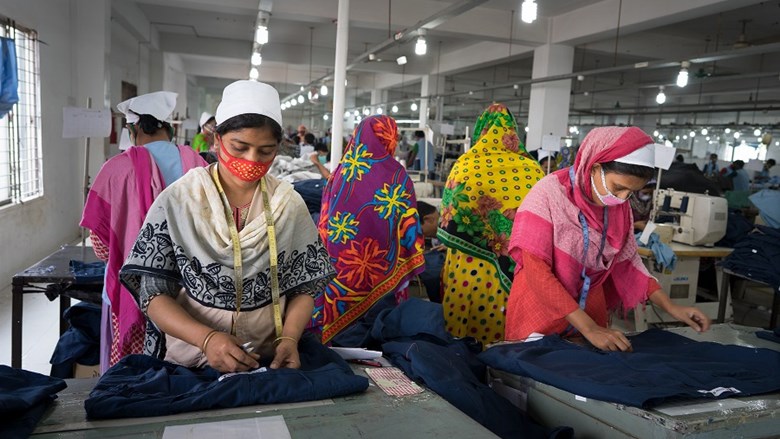Monitoring of safety in garment factories from now on in Bangladeshi hands

From now on, Bangladesh will be in charge of carrying out inspections of its garment factories. A new council, which started its activities on 1 June 2020, will act in compliance with the Bangladesh Accord on Fire and Building Safety. The Accord was established under the supervision of the Global Union Federation IndustriALL, after more than 1,100 employees were killed when the Rana Plaza factory in Dhaka, Bangladesh, collapsed in 2013.

Photo: Catrien Ariens
The new council's name is RMG Sustainability Council (RSC); with RMG being the English abbreviation of ready-made garments. The Council was set up by RMG manufacturers, worldwide clothing brands and retailers, international trade unions, and local trade unions in Bangladesh. 'This is definitely a significant step', says Ruben Korevaar, policy official with Mondiaal FNV, who for quite some time has followed the developments closely. 'The Accord was considered by many to be something that was shoved down their throats from the top. Not so much because of the basic principles but because the responsibilities lay outside the boundaries of Bangladesh. However, with the establishment of the RSC, a sense of responsibility has emerged, which is also felt by several of our partners'.
Monitoring industrial relations and environmental standards
Initially, the RSC will be monitoring safety programmes on the work floor at the more than 1,600 RMG factories covered by the Accord, but the aim is that eventually all RMG exporting garment factories will be checked. 'The RSC also aspires to encompass industrial relations […] and environmental standards in its inspections', the Council stated in their press release.The government of Bangladesh will train the inspectors and will be in charge of monitoring compliance with the agreements.
Continue in the direction taken
Not much will change, according to Raisul Islam Khan, researcher and campaign leader with IndustriALL, the global union actively involved in this sector, with which Mondiaal FNV cooperates closely in this process. 'The RSC will continue in the direction taken'. To date, over 2,100 buildings belonging to the 1,645 companies covered by the Accord, including their secondary establishments, have been inspected. 'More than 91% have started or completed the remediation of their corrective actions plans (CAP)', says Khan, 'which involves mainly fire safety and other safety measures. This will require costly adjustments, and factory owners cannot always release funds promptly to finance these'.
Complaints system playing an increasingly major role
Other Accord-related successes include setting up safety committees and providing safety training to all employees covered by it. 'To date, 1.8 million workers have been informed about major safety standards', says Kahn, 'and 311 safety committees have completed their training'. Furthermore, the complaints system is also playing an increasingly more effective role. More than 1,000 complaints have been processed since the Accord was signed on 15 May 2013. Khan, 'The complaints mechanism works extremely effectively. In 2014, 14 complaints were submitted, and this number has risen to over 700 in 2020. It is noticeable that workers are becoming increasingly aware of their situation, and stand up for themselves much more readily.'
No RSC without the trade unions
Khan believes firmly that without the trade unions, the garment sector in Bangladesh would never have gotten this far. 'The government of Bangladesh and the factory owners wanted the Accord to end in 2018. We have had to fight hard for this process to be achieved and the ultimate transfer to the RSC. Furthermore, this fight has also contributed to the trade unions becoming freer, and to the increased empowerment of workers'.
International clothing brands also pleased
The international clothing brands are also pleased with the process. Roger Hubert, Regional Head Bangladesh, Pakistan & Ethiopia at H&M and brand representative in the Executive Board of the new Council, says: 'With the establishment of the RSC, brands can continue focusing on compliance with their responsibilities in the supply chain, to which they committed themselves on an earlier occasion, following an agreement reached with the trade unions. The RSC guarantees that safety in the workplace will be addressed within the entire Bangladeshi garment-supply chain.
COVID-19: more than one million job losses
The garment industry is currently facing unprecedented times with the COVID-19 pandemic. The roaming virus has had a dramatic impact on the RMG industry in Bangladesh and all entities and people associated with the industry. According to the Bangladesh Garment Manufacturers and Exporters Association (BGMEA, the nationwide trade organisation), 3.19 billion US dollars in current orders have been cancelled, which has affected 1,142 factories with 2.16 million workers. The local media reported that over one million workers have already lost their jobs. An investigation conducted by BRAC University - a private university in Bangladesh - has shown that 47% of the workers in the garment industry are still waiting to be paid, and fear to lose their jobs in the near future. 'The RSC further urges all re-opened RMG factories to implement necessary measures to mitigate Covid-19 exposure [...]', the Council stated in a press release.
Text (Dutch): Astrid van Unen; English translation: Lia Fletcher
Source: RSC press release, 1 June 2020



